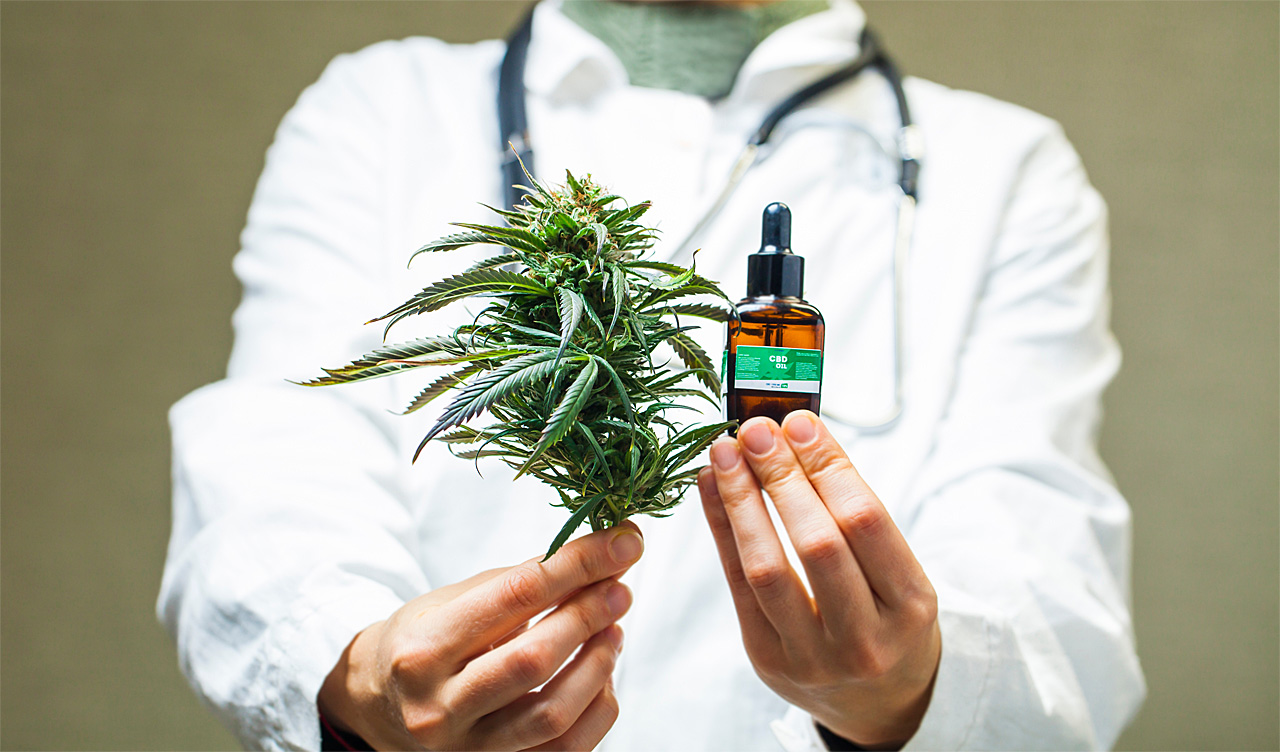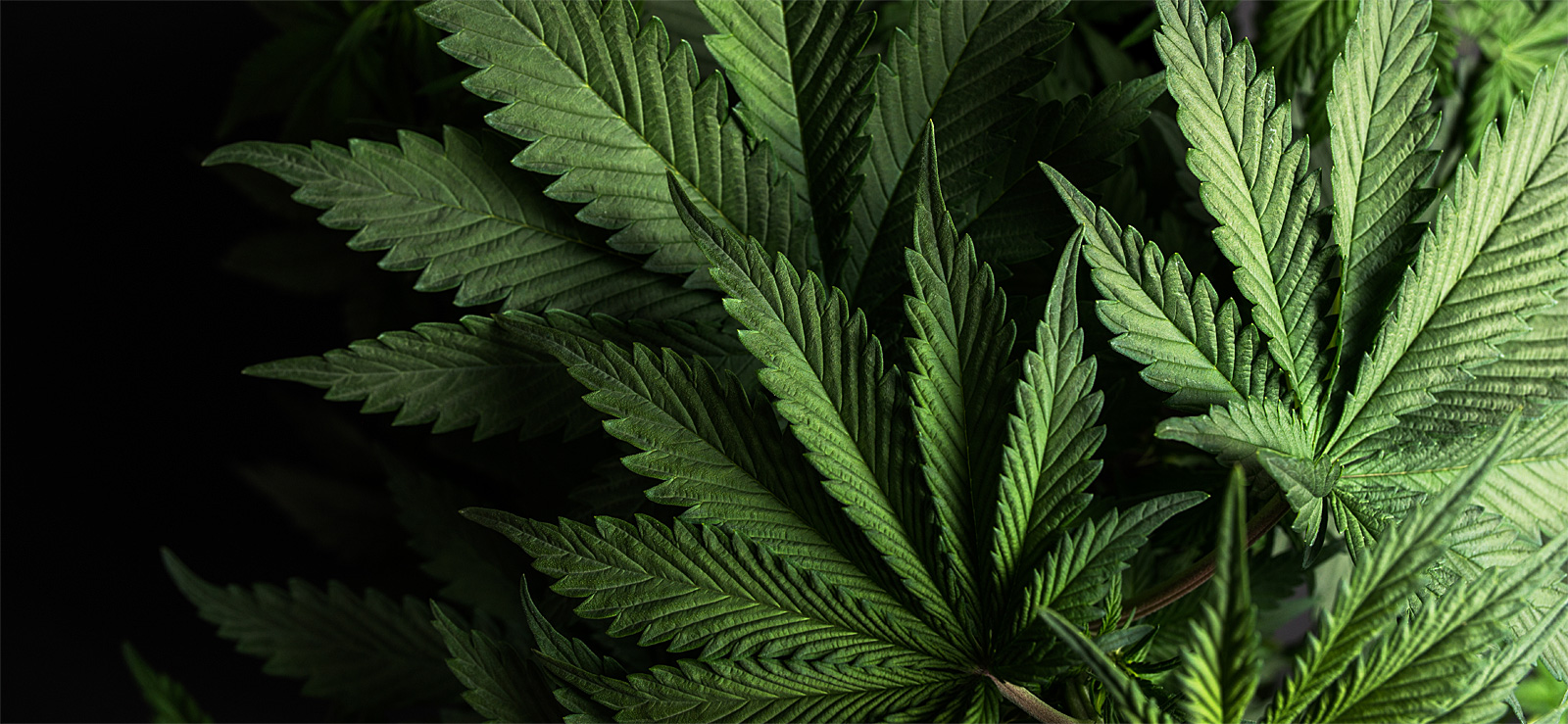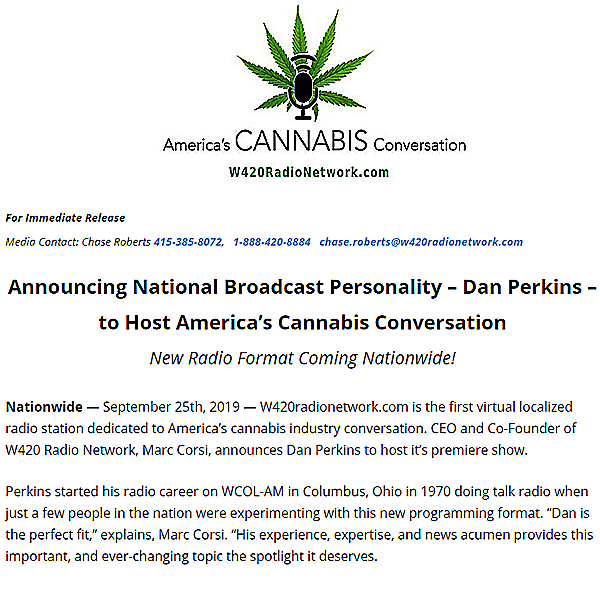Is It Possible That Nature Can Cure Cancer? by Dan Perkins
A New Venue for Cannabis Conversation Addresses Cancer

I told one of my blog publishers that I was starting a new radio network called w420radio network, and I will host the first show, America’s Cannabis Conversation. The network is devoted to providing unbiased information about cannabis to the American people. We found out that because of FCC restrictions on radio and TV stations broadcasting anything about cannabis, Americans are truly under-informed about the features, benefits, and advantages and disadvantage of cannabis.
A radio show host on a sizable national network, with whom I worked for years, learned from authorities that he cannot even use the word cannabis on the air. I went back to the publisher and his position was clear. He strongly opposed legalizing of cannabis. I asked him if he wanted to discontinue publishing my work because of his conviction? He responded, “I like, and my readers love, your writing. Though I may disagree with your position on cannabis, I want my readers to continue to hear what you have to say on other issues.”
I must say, during the nine months we put this show together, I was shocked by what I didn’t know. The lack of factual information is astounding, and medical progress has been woefully under-reported. This subject is important to me because I recently lost a friend to pancreatic cancer, and now cancer patients may actually have some hope.
The Demand for Medical Marijuana
Many discoveries I made excited me about the possibilities of cannabis to heal people. Before my initial research, I believed that the legalization of cannabis would expand the 21 to 35-year-old market, the so-called recreational market. I met the CFO and co-founder of a medical practice in Florida for cannabis prescriptions. He thought that 4 years ago, the average age of the buyer would be 21 to 35. He said he was very wrong; the average age is pushing 55, and he has people in their 90s using cannabis.
The reason older Americans demand cannabis displays every night on TV where pharmaceutical companies advertise their drugs. Because of disclosure rules, many of the ramifications of taking medications must be disclosed. In many cases, one side effect is death. Older Americans are sick of drug side effects, especially if the drugs do not help them. The frustration and ineffective nature of these drugs forced them to begin looking at alternatives. Cannabis is one of those alternatives.
One Case Study Involving Cancer
This is a true story; I will not use the patient’s real name in this article. Mary X was just diagnosed with pancreatic cancer and she wasn’t sure who she should see next, either her oncologist or her attorney. Pancreatic cancer has the worst 5-year survival rates, between 5 to 8%, than any other cancer. Oncologists now think that in 2020, the number of people dying from pancreatic cancer will be the second most deadly cancer in America, behind lung and bronchial cancer.
Mary heard about a study at Mass. General Hospital/Harvard Medical School on new and innovative research for the treatment of pancreatic cancer. She spoke with the head of research to tell him she would give Harvard everything she had in order to be part of the trials that begin next year.
This Study Comes to W420 Radio
I had the opportunity to have several conversations with Dr. Wilfred Ngwa, MS, Ph.D. at Harvard who is conducting the study. I asked him if he would come on America’s Cannabis Conversation show to discuss his discovery. Hear the interview with Dr. Wilfred Ngwa in Season 1, Episode 5
The experiments performed by ‘Dr. Will’ and his team use a strain of cannabis. We are about to get very technical, but I will shortly make it simple to understand. He said the endocannabinoid system (ECS) is a biological system composed of endocannabinoids. These are endogenous lipid-based retrograde neurotransmitters that bind to cannabinoid receptors, and to cannabinoid receptor proteins expressed throughout the vertebrate central nervous system. This includes the brain and peripheral nervous system. If you understood that, good for you. Otherwise, I looked for an alternative way to describe what is happening.
Let me start by putting this in laymen terms: we have several highways in our body that we can use for both good and bad. The bad guys, in this case, pancreatic cancer cells jump on the highway and take off-ramps to the brain, lungs, liver, kidneys, and other organs and dump cancer all over the body. Dr. Ngwa is building up the white blood cells with cannabis to become what he calls the “swat team” to start killing cancer cells and reducing tumors in the pancreas.
Discoveries at Harvard Medical
One unexpected outcome is that the swat team also started killing cancer cells in other parts of the body. Dr. Ngwa says they hope to begin FDA-approved clinical trials early next year. I asked him a crucial question, “Does your protocol have implications to other forms of cancer?” He simply responded, “I believe so.”
I asked him what did he hope would be the outcome of his research: “I hope that we can increase the life expectancy of pancreatic cancer patients, and to do so that the treatment will be very productive and inexpensive, making it available to everyone”. Not everyone has the money or the access to cancer treatment centers. Dr Ngwa believes this is a straightforward procedure. They can administered it in more places with the technology almost every community hospital already has in place.
What it Could Mean
Perkins Twist: implications of this new protocol based on cannabis are ground breaking. The cannabis industry will have an FDA procedure to test its effectiveness and the side effects of cannabis for the treatment of deadly cancer. I know of several universities that are studying cannabis for treatment in a number of other illnesses. Could it be that we may find a way through mother nature to heal ourselves at a low cost, with it being all-natural? Will pharmaceutical companies start buying cannabis growers? You can find more information about Dr. Will at: http://www.dfhcc.harvard.edu/insider/member-detail/member/wilfred-ngwa-phd/
. . . . .

 Announcing National Broadcast Personality, Dan Perkins, Host America’s Cannabis Conversation
Announcing National Broadcast Personality, Dan Perkins, Host America’s Cannabis Conversation